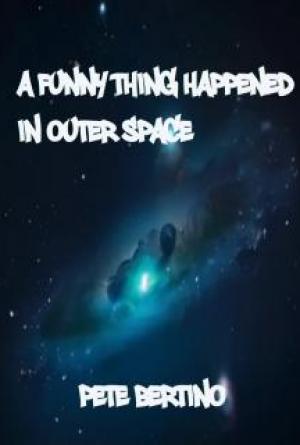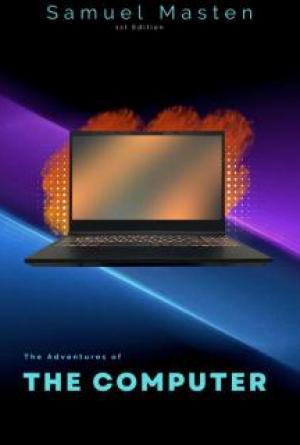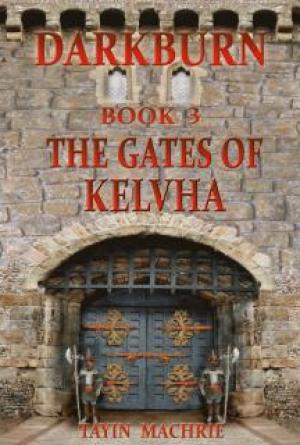CHAPTER V
Revelation
Unfortunately for Jim Forrest his mansion was not equipped with space radar and so the only indication of the arrival of Jack Turner was given in the control room of Turner's captured ship. Turner landed in Forrest's ship beside his own and viewed the huge mansion wonderingly.
Then, shrugging, Captain Turner checked his blaster, appropriated from Forrest's supply in the pilot room, and stepped to the front door of the mansion.
He set the blaster against the doorlock and drilled it once, silently but effectively. He pushed the door open and went in on silent feet. He prowled the place quietly, eventually coming to the laboratory. To find that, after the scene of carpeted floors and all of the myriad things that could be expected in this mansion were it upon Terra, made Turner blink. Incongruity followed incongruity—first this definitely lived-in house on a barren place like Ganymede, then this magnificent laboratory stuck right in what should have been a ballroom.
What manner of man was Jim Forrest?
He stepped into the room, and saw the opened stairway to the cellar—a heck of a place for such, he thought. He went down and saw the cyclotron and it stopped him with sheer wonder. He saw Jim Forrest and Ellen Haynes, busily engaged in working over the cyclotron-target.
He lifted the blaster and said, "Up with 'em!"
They turned and blinked.
Then Forrest smiled.
"Well," he said in amusement. "Now the picture is complete! We have three factions present. One that wants to make zonium work. One who wants to destroy it utterly. One who wants it to sit in a laboratory case and moulder. Now what, Captain Turner?"
"You are my prisoners," he stated flatly. "You, Jim Forrest, are now accused of attempting to experiment on government property as well as stealing it."
"I intend to destroy it," said Forrest flatly.
"I intend to stop you," said Turner sharply. "And I've had enough foolishness!"
Ellen smiled. She turned, picked up the zonium crystal and handed it to Turner.
"Jack," she said softly, "I know what it will do now."
Captain Turner of the Space Guard smiled bitterly. "Well," he said, "what will it do?"
"It will withstand the blaster beam," said Ellen Haynes.
"I don't believe it," said Turner.
She placed the cube on a metal table and motioned for him to drill it. Turner shrugged.
"No," he said, "I'll not destroy government property."
"But you won't," she said.
"There are other things that will withstand the blast," said Turner. "Less difficult elements to make than zonium."
Forrest smiled. "Go ahead and fire," he said. "You'll hurt nothing.”

Forrest smiled. "Go ahead and fire," he said. "You'll hurt nothing!"
Doubtfully Turner lifted the weapon. Neither of them would have told him to do so if it were not true. Both of them had been willing to steal to get it. They'd not see it destroyed, for Turner did not believe Forrest's statement to the effect that he intended to destroy it.
He pressed the trigger of his blaster and—
Nothing happened!
He turned the weapon away from the crystal, pointed it down into the concrete floor and tried again.
Nothing happened!
"What is this?" he asked, checking the weapon. It was charged. It should have worked.
"This," smiled Jim Forrest, "happens to be one place in the Solar System where no blaster will fire. I have an anti-radiation field working in here that selectively prevents blaster output. Your blaster beam will just not propagate here."
"There's no such field known," said Turner stolidly.
Forrest smiled, went to the wall and pressed a button. "Now try it," he said.
Turner blasted the floor and it worked, but violently. Forrest then released the button. "So," said Forrest, "we need not fear your weapon, Turner. Now, may I explain?"
"Do so."
Forrest smiled genially. "Come on up to the living room," he said. "It's a long story and we might as well be comfortable. I promise that there will be no violence. I've worked rather hard to see that this identical situation obtained. I'll not spoil it now!"
Wondering, they followed Forrest, who had taken over the leadership again. Forrest mixed a drink at the serviette and handed one to each of them. He opened cigarette boxes on the coffee table before the sofa upon which Ellen and Turner were sitting. He turned to the fireplace and touched a button. The logs flickered.
"Artificial," he said unhappily. "I hope some day to go where I can have a real fireplace but everything that goes up the chimney as air must be replaced from somewhere, since we couldn't use Ganymedian air very long without developing a vicious case of bronchitis. But it looks pleasant anyway.
"Zonium," said Forrest, "is a rarity. Do you know where the elements of the universe come from?"
"Do you?" asked Ellen skeptically.
"According to established theory," replied Forrest, "the sun is running due to the so-called Solar Phoenix. Carbon is forced to combine atomically with hydrogen under the pressure-temperature conditions of the sun, releasing a gamma quantum, and producing nitrogen thirteen which is unstable and by ejecting a positron returns to carbon thirteen.
"Carbon thirteen takes on another hydrogen, becoming nitrogen fourteen, which is stable. Nitrogen takes on hydrogen, becoming oxygen fifteen, which ejects a positron and becomes nitrogen fifteen. Another hydrogen makes it oxygen sixteen, which is stable excepting in the solar conditions, where it ejects an alpha particle and reverts back to carbon again, ready to go through the same process.
"Sometimes the oxygen does not break down but takes on another hydrogen again, becoming fluorine seventeen, which breaks down by positron ejection to oxygen seventeen—and another hydrogen brings it up to fluorine eighteen, back to oxygen eighteen and up to stable fluorine nineteen. You can go up and back, adding hydrogen, to make every known element.
"The curve of elemental stability peaks across iron. Elements lower than iron are more easily built up and elements above iron are more easily broken down. The whole roster of natural elements is accepted as being built by offshoots of the Solar Phoenix."
"And zonium?" asked Turner.
"The ability of zonium to withstand the blaster beam," said Forrest, "is due to the fact that zonium is really an element from another universe!"
"Another universe?" exploded Ellen Haynes.
"Right," he said. "A universe which operates differently from our own but which produces elements fundamentally constructed of the standard atomic particles of energy, which are basic. Zonium will not combine chemically with any Terran element. Its physical effects are outrageous compared with even the transuranic elements which carry the Solar Phoenix to the extremes far above uranium."
Forrest went on to explain in detail the effects of zonium on the sun. "Zonium came into being by unhappy accident," he said. "Only the furious energy of transmutation can breach the dividing energy-levels between the universes of the Cosmos. It takes place under high magnetic, electric, and optical conditions.
"These effects took place, according to my theory, at a coincidental instant when the element under bombardment was adjacent in space-time with a small crystal of zonium in the other universe.
"Using that for a pattern, this crystal of zonium came into being, was measured and accepted as a certain element in the scale. The space occupied by zonium on the periodic chart is fillable, but the metal that will be made will not be zonium like this crystal.
"Any more zonium of this type must have a splinter of this rock for a matrix to start the peculiar intra-atomic structure that gives zonium its bizarre properties.
"Once this is destroyed, as it must be, it can be made again only by extreme happenstance, for the possibility of conjacent matter between the two universes is no less a probability than possible collisions between—not suns in the galaxy but the galaxies themselves!"
"But why couldn't all this be explained?" demanded Turner. "It seems to have entailed a large amount of mad galloping."
Forrest smiled.
"You two people are very much involved," he said. "You are attracted to one another, which is itself good. Yet your viewpoints differed greatly. So long as the zonium existed you could not but let it mar your love. Ellen felt deprived of possible benefits. Jack was a symbol of that which barred Ellen and Ellen was a symbol of that which resented everything that Captain Turner of the Space Guard held honorable.
"It is certain that the future existence of Sol depends upon the destruction of this crystal. A stasis existed during all the years of its dust-collecting stay in the laboratory, a stasis that merely was a threat to the future. For destruction must be complete!
"Supposing I merely hurled the thing into space at a velocity high enough to send it, eventually, into the gravitational grasp of some distant star. A nova would result—a nova with the Solar Phoenix gone wild and with a sample of zonium upon which to build uncounted tons of more zonium, which in explosion would be hurled throughout the universe! A chain-fission extending to every star in the universe, given time!
"Where then," he asked loftily, "would the hoped-for Grand Galactic Civilization be? Yes, I am planning on fifty million galactic years, with Sol grown cold and dead ere man is united throughout the universe. It must have its chance!"
"But why the penny's worth of plotting?" asked Turner.
"I had to do that which would bring you two together," smiled Forrest. "The silent inert threat of zonium in the laboratory was bad enough but stabilized. I could watch that. Knowing that Ellen Haynes would try to take it eventually, I merely spent my time keeping tabs on the young and attractive lady until she swiped it. Then I took it, knowing that you were on the trail.
"I was a little surprised to find Ellen in my spaceship but it saved me the trouble of collecting her at a later date. I anticipated that you would arrive and that I could cope with you, Turner. Well, my machinations over that incident went to pieces and I planned then upon the fact that Ellen was available.
"So I spent the intervening time explaining to her just exactly how I knew the dangers of zonium. I knew also that you'd be arriving but I didn't know how soon. I've still to destroy that rock, you know. But now that I've shown Ellen and explained to you, your psychopathic animosity toward one another's principles is gone.
"By stealing the rock from Ellen and giving you the chance to offer her a means of absolution I showed her your interest. By preventing her experimentation when she took off with it I prevented disaster.
"Instead of zonium, Guardsman, I offer you the anti-propagation field. Here are notes—you and Ellen take them and expand them so that the invention will be yours.
"And now," he said, "I'm going downstairs again and blast this zonium rock into something inert."
"And we?"
Forrest laughed. "You are to go back and explain your deputization of Ellen Haynes and my theft and destruction of the zonium block. Also," he grinned, "you two have been racing all over the system together. You'd better marry the wench, Turner, and save her good name."
"Will you, Ellen?" asked the Captain.
She nodded vehemently but her gaze was on Jim Forrest.
"But you, Jim," she said. "They'll be hounding you from here on."
"Oh me? I'm a lawbreaker," he said. "I'll escape easily."
"How?"
"Easily," he said. "I'll be out of here in time. Just give me time!"
He grinned and insisted that they leave at once. He escorted them, walking between them to the Guardship. He shook hands with Turner and congratulated him. He turned to Ellen Haynes and, with a half-smiling, half-serious expression, bent forward and kissed her lightly on the lips.
"Goodbye—Grandmother," he laughed.
He shoved her inside the spacelock and snapped the starting switch on the frame of the door. The lock clanged shut.
"Grandmother!" exploded Ellen. "What did he mean by that?"
Jack Turner had a flash of inspiration. "He said he would escape—in time," he muttered slowly. "The greatest meddler in all time. But look, Ellen, his name is Forrest, not Turner."
"Funny man," she said dreamily, "Egotist. Ever give thought to the idea that your—our—firstborn might be a girl?"








